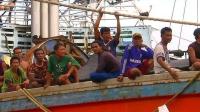 Myint Naing, a Burmese man, recently made it home 22 years after being taken aboard a Thai fishing trawler, where he worked as little more than a slave. In the last six months an estimated 2,000 enslaved fishermen have been freed from captivity from Thai-Indonesian fishing ventures.
Myint Naing, a Burmese man, recently made it home 22 years after being taken aboard a Thai fishing trawler, where he worked as little more than a slave. In the last six months an estimated 2,000 enslaved fishermen have been freed from captivity from Thai-Indonesian fishing ventures.
The trawlers fished for low value fish, often called “trash fish” that are used as feed stock for aquaculture, such as pond-raised shrimp. The trash fish are also used in pet foods.
As reported by the New York Times: Every year, thousands of migrant workers like Myint are tricked or sold into the seafood industry’s gritty underworld. It’s a brutal trade that has operated for decades as an open secret in Southeast Asia’s waters, where unscrupulous companies rely on slaves to supply fish to major supermarkets and stores worldwide.
As part of a year-long investigation into the multibillion-dollar business, The Associated Press interviewed more than 340 current and former slaves, in person or in writing. The stories told by one after another are strikingly similar. …
Thailand earns $7 billion a year from a seafood industry that runs on labor from the poorest parts of the country, along with Cambodia, Laos and especially Myanmar, otherwise known as Burma. Up to 200,000 estimated migrants, most of them illegal, work at sea. Their catch ends up halfway around the globe in the United States, Europe and Japan — on dinner tables and in cat food bowls. …
There is some hope of change, however. Much of the fish caught by the ships using slave labor is destined for the United States. In August, a California resident filed a lawsuit against Costco, accusing the American “big-box” retailer of misleading consumers about their sea food and its role in the rampant slave labor and trafficking of the global seafood industry, the epicenter of which is Thailand. Then in September, Nestles, the Swiss food conglomerate, was hit with a class action lawsuit, in which a group of nationwide consumers alleged the company knowingly used a seafood supplier that employs slave labor and human trafficking in fish used in Nestle’s Fancy Feast cat food.
In the recent past, pressure from Western buyers has resulted in improved labor practices in Asia. In the 1980s and 90s, Nike, the sports shoe manufacturer, was accused of buying its shoes from factories using child slave labor in Vietnam, Indonesia and other Asian nations. After considerable public shaming, Nike has reformed its buying practices and instituted standards and inspections to ensure that these standards are met. Likewise, Apple in recent years has been widely criticized for abusive conditions at, Foxconn, and other suppliers of Apples iPads and iPhones. Apple has promised effective action to correct the problems. Whether they will fully deliver on those promises remains to be seen.
The challenge in the case of slave labor on fishing boats is, unlike sneaker or iPhone factories, which are relatively easy to inspect, fishing fleets are literally moving targets. The result of reporting by the Associated Press, and other news outlets, has resulted in some progress. Likewise, lawsuits can often be effective ways to catch the attention of corporate buyers. Nevertheless, as noted by the AP, in the NYTimes:
The slave trade in the Southeast Asian seafood industry is remarkable in its resilience. Over the past decade, outsiders have begun to take notice, and the U.S. government slams Thailand in annual reports year after year for pervasive labor abuses in fishing. Yet it continues, and it seldom lets go of the lives of those it ruins.
The government of Thailand is finally acknowledging the problem and is promising action. CNN reports: Thai Prime Minister Prayuth Chan-ocha has told CNN that slave labor in his country’s fishing industry “is now severe” and that Thailand will act to tackle it.
One concern is that as the government and Western buyers crack down on operators using slave labor, the captains will shift toward human trafficking.
A Guardian investigation has linked Thailand’s fishing industry with the vast transnational trafficking syndicates profiting from the misery of some of the most persecuted people on Earth.
Slavery at sea: Thai fishing industry turns to trafficking | Guardian Investigations
Thanks to Irwin Bryan for contributing to this post.

Ever since reading the NY Times article, I’ve tried to buy pet food made in USA. So difficult to tell the origins of products and not unwittingly contribute to the horrible situation.
Pingback: Kort | Bootjesgek.nl
Other than avoiding Purina cat food brands, it is almost impossible to know where the fish do come from and how they are harvested.